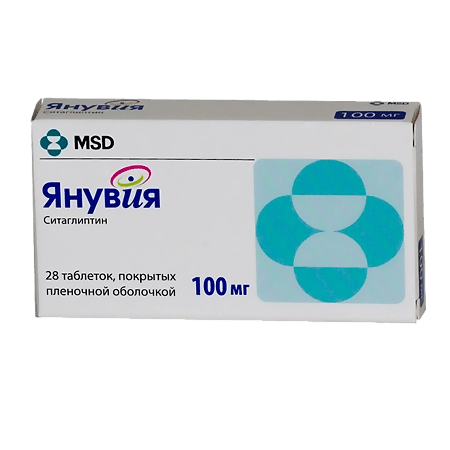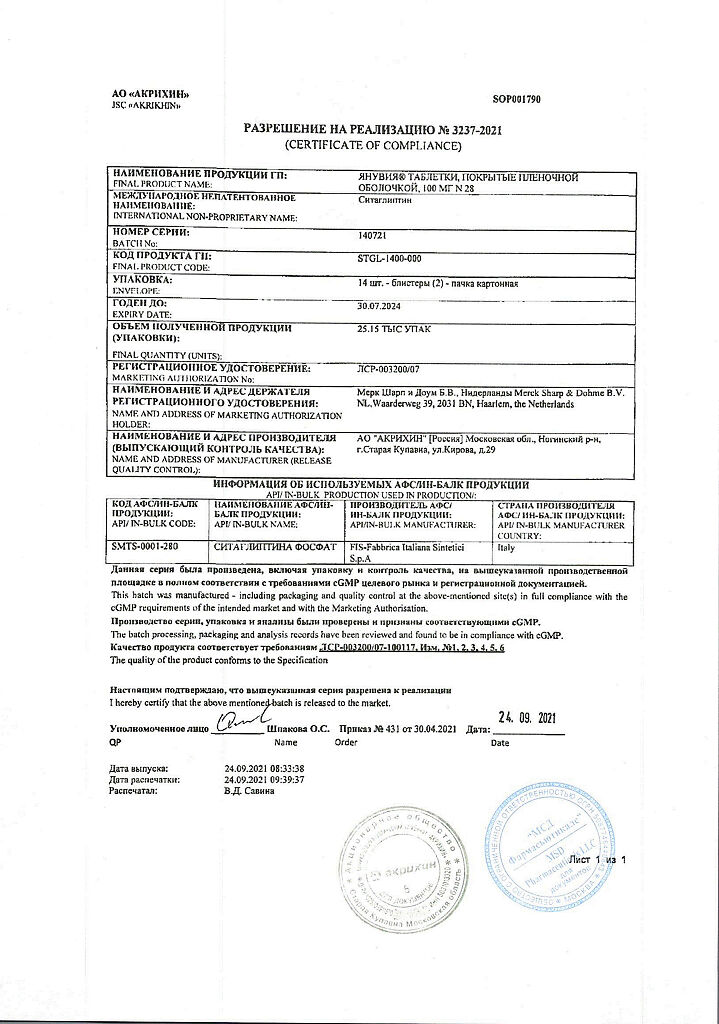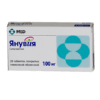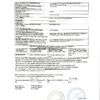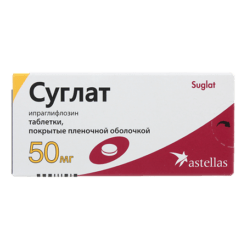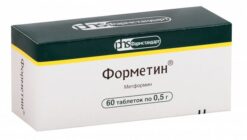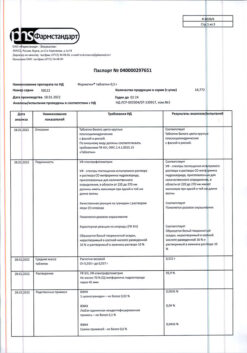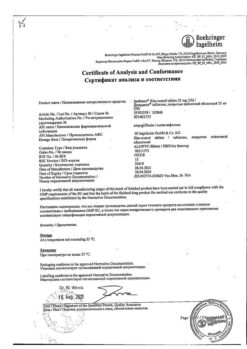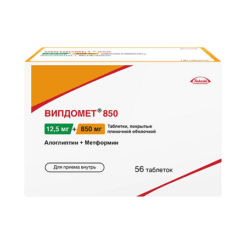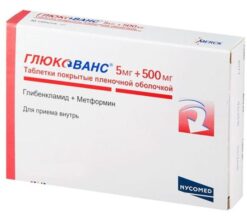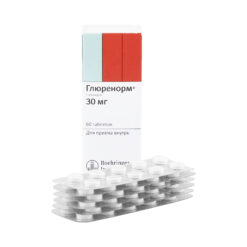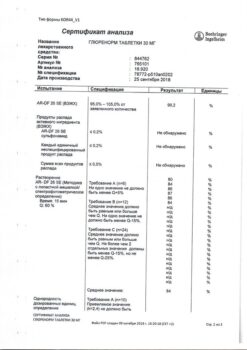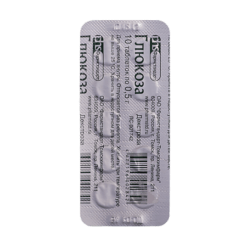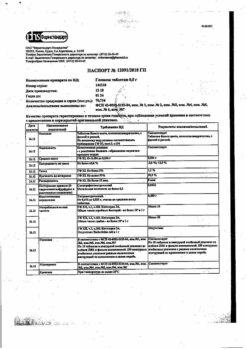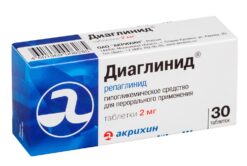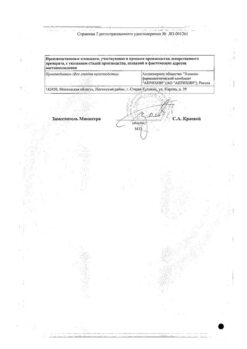No products in the cart.
Januvia, 100 mg 28 pcs.
€47.10 €40.82
Description
Januvia is an oral hypoglycemic drug, a highly selective inhibitor of dipeptidyl peptidase 4 (DPP-4).
. Sitagliptin differs in chemical structure and pharmacological action from glucagon-like peptide-1 (GFP-1) analogues, insulin, sulfonylurea derivatives, biguanides, γ-receptor agonists activated by peroxisome proliferator activated receptor (PPAR-γ), alpha-glycosidase inhibitors, amylin analogues. By inhibiting DPP-4, sitagliptin increases the concentration of 2 known hormones of the incretin family: GFP-1 and glucose-dependent insulinotropic peptide (GIP).
The hormones of the incretin family are secreted in the intestine throughout the day and their levels increase in response to food intake. The incretins are part of the internal physiological system of glucose homeostasis regulation. At normal or elevated blood glucose levels hormones of the hormone family of insectins increase insulin synthesis as well as its secretion by pancreatic β-cells through signaling intracellular mechanisms associated with cyclic AMP.
PPP-1 also contributes to the suppression of increased glucagon secretion by pancreatic α-cells. Decrease of glucagon concentration against the background of increase of insulin level promotes decrease of glucose production by liver that results in decrease of glycemia.
When blood glucose concentration is low, the listed effects of incretins on insulin release and decrease in glucagon secretion are not observed. GFP-1 and GIP have no effect on glucagon release in response to hypoglycemia. Under physiological conditions, the activity of the insectins is limited by the enzyme DPP-4, which rapidly hydrolyzes the insectins to form inactive products.
Sitagliptin prevents hydrolysis of incretins by DPP-4 enzyme, thereby increasing plasma concentrations of active forms of GFP-1 and GIP. By increasing the level of incretins, sitagliptin increases glucose-dependent insulin release and helps to decrease glucagon secretion. In patients with type 2 diabetes with hyperglycemia these changes in insulin and glucagon secretion lead to a decrease in glycated hemoglobin HbA1C and a decrease in plasma glucose concentration determined on an empty stomach and after a loading test.
. In patients with type 2 diabetes a single dose of Januvia leads to inhibition of DPP-4 enzyme activity for 24 hours, which leads to increase of circulating insulin GFP-1 and GIP by 2-3 times, increase of plasma concentration of insulin and C-peptide, decrease of plasma glucagon concentration, decrease of fasting glucose, and decrease of glucose after glucose load or food load.
Indications
Indications
Monotherapy: As an adjunct to diet and exercise to improve glycemic control in type 2 diabetes.
Combination therapy: type 2 diabetes mellitus to improve glycemic control in combination with metformin or PPAR agonists (eg, thiazolidinedione), when diet and exercise in combination with monotherapy with these drugs do not lead to adequate glycemic control.
Pharmacological effect
Pharmacological effect
Januvia is an oral hypoglycemic drug, a highly selective inhibitor of dipeptidyl peptidase 4 (DPP-4).
Sitagliptin differs in chemical structure and pharmacological action from glucagon-like peptide-1 (GLP-1) analogs, insulin, sulfonylureas, biguanides, peroxisome proliferator-activated receptor-γ (PPAR-γ) agonists, alpha-glycosidase inhibitors, and amylin analogs. By inhibiting DPP-4, sitagliptin increases the concentration of 2 known hormones of the incretin family: GLP-1 and glucose-dependent insulinotropic peptide (GIP).
Hormones of the incretin family are secreted in the intestines throughout the day, and their levels increase in response to food intake. Incretins are part of the intrinsic physiological system for regulating glucose homeostasis. With normal or elevated blood glucose levels, hormones of the incretin family promote an increase in insulin synthesis, as well as its secretion by pancreatic β-cells due to intracellular signaling mechanisms associated with cyclic AMP.
GLP-1 also helps suppress increased glucagon secretion by pancreatic α-cells. A decrease in glucagon concentration against the background of an increase in insulin levels helps to reduce the production of glucose by the liver, which ultimately leads to a decrease in glycemia.
At low blood glucose concentrations, the listed effects of incretins on insulin release and a decrease in glucagon secretion are not observed. GLP-1 and GIP do not affect glucagon release in response to hypoglycemia. Under physiological conditions, the activity of incretins is limited by the enzyme DPP-4, which rapidly hydrolyzes incretins to form inactive products.
Sitagliptin prevents the hydrolysis of incretins by the DPP-4 enzyme, thereby increasing plasma concentrations of active forms of GLP-1 and GIP. By increasing the level of incretins, sitagliptin increases glucose-dependent insulin release and helps reduce glucagon secretion. In patients with type 2 diabetes mellitus with hyperglycemia, these changes in insulin and glucagon secretion lead to a decrease in the level of glycated hemoglobin HbA1C and a decrease in plasma glucose concentrations determined on an empty stomach and after an exercise test.
In patients with type 2 diabetes mellitus, taking a single dose of Januvia leads to inhibition of the activity of the DPP-4 enzyme for 24 hours, which leads to an increase in the level of circulating incretins GLP-1 and GIP by 2-3 times, an increase in plasma concentrations of insulin and C-peptide, a decrease in the concentration of glucagon in the blood plasma, a decrease in fasting glycemia, as well as a decrease in glycemia after a load of glucose or food loads.
Special instructions
Special instructions
In clinical studies of Januvia as monotherapy or as part of combination therapy with metformin or pioglitazone, the incidence of hypoglycemia with Januvia was similar to the incidence of hypoglycemia with placebo.
The combined use of Januvia in combination with drugs that can cause hypoglycemia, such as insulin, sulfonylurea derivatives, has not been studied.
Patients with mild to moderate hepatic impairment do not require dose adjustment of Januvia.
In clinical studies, the efficacy and safety of Januvia in elderly patients (≥65 years, 409 patients) were comparable to those in patients younger than 65 years. No dose adjustment according to age is required.
Elderly patients are more likely to develop renal failure. Accordingly, as in other age groups, dose adjustment is necessary in patients with severe renal failure.
Active ingredient
Active ingredient
Sitagliptin
Composition
Composition
One film-coated tablet contains:
Active substance:
Sitagliptin (as phosphate monohydrate) 100 mg.
Excipients:
Microcrystalline cellulose;
Calcium hydrophosphate;
Croscarmellose sodium;
Magnesium stearate;
Sodium stearyl fumarate.
Shell composition:
Opadry II beige 85 F17438;
Polyvinyl alcohol;
Titanium dioxide;
Macrogol (polyethylene glycol) 3350;
Talc;
Iron oxide yellow;
Iron oxide red.
Pregnancy
Pregnancy
Adequate and strictly controlled clinical studies of the safety of Januvia in pregnant women have not been conducted.
The use of the drug during pregnancy is contraindicated.
It is not known whether sitagliptin is excreted into breast milk in humans.
If it is necessary to use the drug during lactation, the issue of stopping breastfeeding should be decided.
Contraindications
Contraindications
Diabetes mellitus type 1.
Diabetic ketoacidosis.
Pregnancy.
Lactation period (breastfeeding).
Hypersensitivity to the components of the drug.
It is not recommended to prescribe the drug Januvia to children and adolescents under the age of 18 years (there are no data on the use of the drug in pediatric practice).
Use with caution in patients with renal failure.
In moderate to severe renal failure, as well as in patients with end-stage renal failure requiring hemodialysis, dosage adjustment is required.
Side Effects
Side Effects
From the digestive system: abdominal pain, nausea, vomiting, diarrhea. Laboratory indicators: hyperuricemia, decreased activity of the total and partially bone fraction of alkaline phosphatase, leukocytosis due to an increase in the number of neutrophils.
Other (a cause-and-effect relationship with the drug has not been established): upper respiratory tract infections, nasopharyngitis, headache, arthralgia. The incidence of hypoglycemia is similar to that observed with placebo.
Interaction
Interaction
In interaction studies with other drugs, sitagliptin did not have a clinically significant effect on the pharmacokinetics of the following drugs: metformin, rosiglitazone, glibenclamide, simvastatin, warfarin, oral contraceptives.
Based on these data, sitagliptin does not inhibit CYP3A4, 2C8 or 2C9 isoenzymes. Based on in vitro data, sitagliptin also does not appear to inhibit CYP2D6, 1A2, 2C19 or 2B6, nor does it induce CYP3A4. There was a slight increase in AUC (11%) as well as mean C max (18%) of digoxin when used in combination with sitagliptin. This increase is not considered clinically significant. It is not recommended to change the dose of either digoxin or Januvia when used simultaneously.
There was an increase in the AUC and C max of sitagliptin by 29% and 68%, respectively, in patients when Januvia was co-administered in a single dose of 100 mg and cyclosporine (a potent inhibitor of p-glycoprotein) in a single dose of 600 mg. These changes in the pharmacokinetic parameters of sitagliptin are not considered clinically significant. It is not recommended to change the dose of Januvia when used together with cyclosporine and other p-glycoprotein inhibitors (for example, ketoconazole).
A population pharmacokinetic analysis in patients and healthy volunteers (n=858) receiving a wide range of concomitant medications (n=83, approximately half of which are excreted renally) did not reveal any clinically significant drug effects on the pharmacokinetics of sitagliptin.
Overdose
Overdose
Symptoms: During clinical studies on healthy volunteers, good tolerability was observed when taking Januvia in a single dose of 800 mg.
Minimal changes in the QTc interval, not considered clinically significant, were observed in one study of the drug at the indicated dose. Clinical studies of the drug at a dose of more than 800 mg/day have not been conducted.
Treatment: removal of unabsorbed drug from the gastrointestinal tract, monitoring vital signs, including ECG, and, if necessary, providing symptomatic and supportive therapy. Sitagliptin is poorly dialyzable.
In clinical studies, only 13.5% of the dose was removed from the body during a 3-4 hour dialysis session. Prolonged dialysis can be prescribed if clinically necessary. There are no data on the effectiveness of peritoneal dialysis with sitagliptin.
Storage conditions
Storage conditions
At a temperature not exceeding 30 °C.
Shelf life
Shelf life
2 years.
Manufacturer
Manufacturer
Akrikhin JSC, Russia
Additional information
| Shelf life | 2 years. |
|---|---|
| Conditions of storage | At a temperature not exceeding 30 °C. |
| Manufacturer | Akrihin HFC JSC, Russia |
| Medication form | pills |
| Brand | Akrihin HFC JSC |
Related products
Buy Januvia, 100 mg 28 pcs. with delivery to USA, UK, Europe and over 120 other countries.

